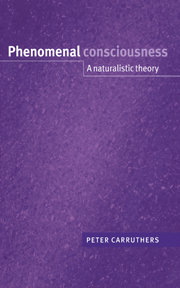Book contents
- Frontmatter
- Contents
- List of figures
- Preface
- 1 Assumptions, distinctions, and a map
- 2 Perspectival, subjective, and worldly facts
- 3 Explanatory gaps and qualia
- 4 Naturalisation and narrow content
- 5 First-order representationalism
- 6 Against first-order representationalism
- 7 Higher-order representationalism: a first defence
- 8 Dispositionalist higher-order thought theory (1): function
- 9 Dispositionalist higher-order thought theory (2): feel
- 10 Phenomenal consciousness and language
- 11 Fragmentary consciousness and the Cartesian theatre
- Conclusion
- References
- Author index
- Subject index
11 - Fragmentary consciousness and the Cartesian theatre
Published online by Cambridge University Press: 30 September 2009
- Frontmatter
- Contents
- List of figures
- Preface
- 1 Assumptions, distinctions, and a map
- 2 Perspectival, subjective, and worldly facts
- 3 Explanatory gaps and qualia
- 4 Naturalisation and narrow content
- 5 First-order representationalism
- 6 Against first-order representationalism
- 7 Higher-order representationalism: a first defence
- 8 Dispositionalist higher-order thought theory (1): function
- 9 Dispositionalist higher-order thought theory (2): feel
- 10 Phenomenal consciousness and language
- 11 Fragmentary consciousness and the Cartesian theatre
- Conclusion
- References
- Author index
- Subject index
Summary
I have argued for the superiority of higher-order thought (HOT) theory over higher-order description (HOD) theory: there is no reason to think that a theory of phenomenal consciousness should implicate natural language, and there is good reason to think that it should not. This leaves untouched Dennett's (1991) arguments for a ‘multiple drafts’ approach to phenomenal consciousness, however, and in support of the radical indeterminacy of facts concerning the latter; together with his attacks on ‘Cartesian theatre’ models of phenomenal consciousness (of which both his own earlier 1978 theory and my sort of HOT theory are alleged examples). These arguments will form the topic of this final chapter.
Multiple drafts versus integrated contents
In fact HOD theory and multiple-drafts theory are doubly dissociable: each can be believed independently of the other. We have already seen how HOD theory can be endorsed in the absence of multiple-drafts theory – being associated, rather, with the claim that the contents of the phenomenal-consciousness system C are rich and determinate. (This was, in effect, Dennett's 1978 view.) But it would also be possible to combine a multiple-drafts account with dispositionalist HOT theory. Everything in the account of chapters 8:3 and 9:3 could remain the same, except that any commitment to a C-box with determinate contents could be dropped. In its place, we could propose multiple streams of processing, the contents of which are neither determinately conscious nor determinately non-conscious; with a perceptual content only becoming determinately phenomenally conscious when probed to produce a higher-order thought about itself.
- Type
- Chapter
- Information
- Phenomenal ConsciousnessA Naturalistic Theory, pp. 297 - 324Publisher: Cambridge University PressPrint publication year: 2000



